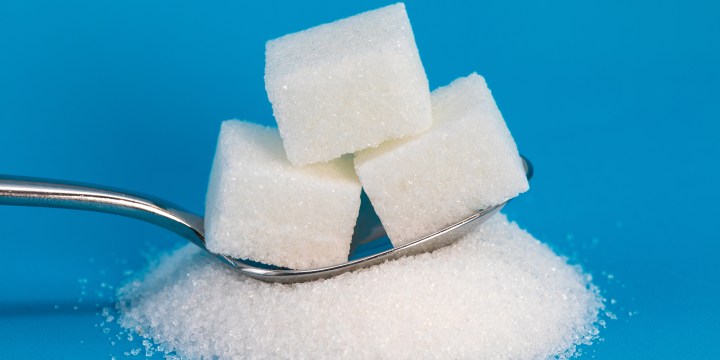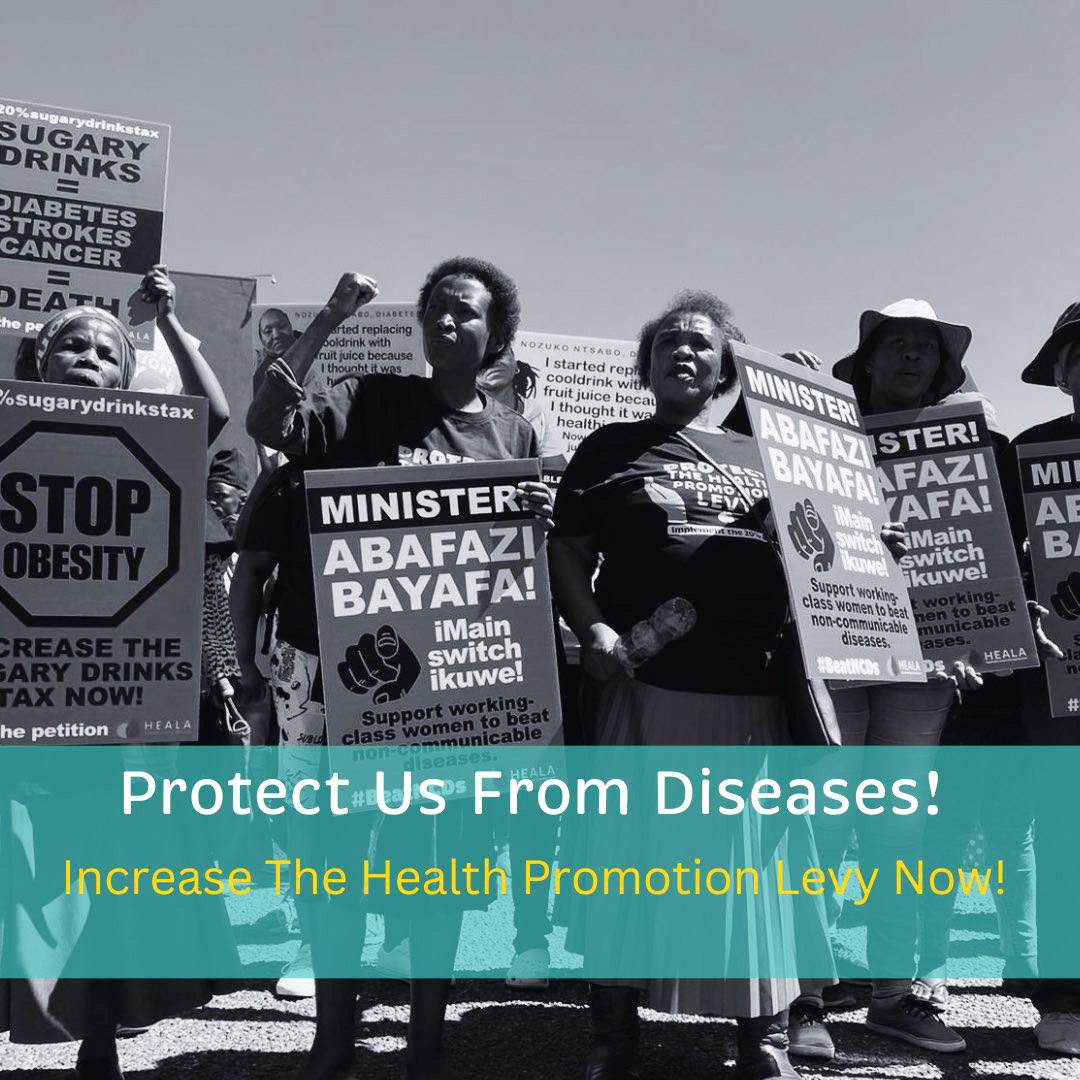BUDGET 2023
Putting sugar tax on hold shows disregard for health of citizens – healthy-living activists

‘I’m astonished that the government cares so little about the health of their citizens,’ said Professor Karen Hofman, a leading researcher in sugar and other health-related taxes.
Health scientists and activists have expressed dismay and disappointment at the announcement of a two-year moratorium on increasing the sugar tax in Wednesday’s Budget, with the government apparently heeding calls from the sugar industry to freeze the tax to try to protect an ailing industry. This comes after the inflationary increase in the tax announced in the 2022 Budget was also paused, until April 2023, for the same reason.
Civil society coalition Heala, the Healthy Living Alliance, said that the announcement by Finance Minister Enoch Godongwana, coupled with “ineffective increases” in other health-related taxes such as alcohol and tobacco, “is a direct attack on the lives of millions of people at risk of serious health conditions such as diabetes, cardiovascular diseases and cancer”.
The SA Sugar Association and the SA Cane Growers’ Association have in recent months lobbied the government to freeze or scrap the sugar tax, called the Health Promotion Levy (HPL), altogether. At the same time, civil society has been asking the government to increase the tax from 11% to 20%, in line with a World Health Organization (WHO) recommendation for countries to impose sugar taxes to help prevent obesity and related diseases.
“I’m astonished that the government cares so little about the health of their citizens,” said Professor Karen Hofman, a leading researcher in sugar and other health-related taxes and Director of Priceless, a research team at the Wits School of Public Health.
“This has been going on for six years, and the cost of the Treasury inaction is extremely high in terms of the health of South Africans and obesity-related conditions, which were the cause of many thousands of deaths from Covid,” Hofman told Maverick Citizen.
“This is pure pandering to the private sector. Government seems perfectly able to deal with alcohol and tobacco, and the fact that this has not even increased by inflation is a serious omission by the Treasury that will have consequences for years to come in terms of obesity-related conditions.”
In 2017, when the Treasury first proposed the tax, the rate was 20%, in line with the WHO’s recommendation, but a year of “public consultation,” including lobbying by the South African sugar industry, resulted in a reduction of the tax to 10%. (It was implemented one year later at 11%, to account for inflation.)
“There will never be a rationale for the decision to deviate from the government’s constitutional obligations in order to satisfy the sugar industry and other big business,” said Heala’s programme director, Nzama Mbalati, after the Budget speech. “This decision is not in the interest of ordinary people, instead it puts profits ahead of people.”
The tax has been fiercely contested territory since the government introduced it in 2018, charging drinks manufacturers 2.1c for every gram of sugar above 4g per 100ml.
The beverage industry responded by passing the tax on to consumers and also reducing the quantity of sugar in their drinks by replacing it with non-nutritive sweeteners, which may also have harmful effects on human health. (Impending front-of-pack labelling legislation will include warning labels for foods and drinks containing artificial sweeteners.)
The HPL was designed to support the Department of Health’s aim “to decrease diabetes, obesity and other related diseases in South Africa”, according to SARS, by reducing consumers’ purchases of sugary drinks and thus lowering their sugar intake. Yet revenues from the tax — more than R10-billion so far, with an anticipated R2.3-billion more in the year ahead — have not been manifestly spent on health promotion of any sort, much less on obesity and related disease programmes.
Sugar consumption has been proven by scientists, in South Africa and many other countries, to be a major cause of high rates of obesity and type-2 diabetes.
In 2018, diabetes was the second-largest cause of death among South Africans, after tuberculosis. At least 4.2 million adults in South Africa are diabetic. Around half of all adults in South Africa are overweight (23%) or obese (27%), and about 12 million people suffer from weight-related diseases — such as diabetes, hypertension, cardiovascular diseases, arthritis and some cancers — for which they receive treatment in the public sector, says Wits researcher Micheal Boachie. (In financial terms, this costs the South African health system at least R33-billion per year, the same team at Wits showed last year.)
Liquid sugar in particular is considered especially harmful: Research in 2015 published in Global Public Health shows that drinking even one sugary beverage a day increases an adult’s likelihood of being overweight by 27%, and a child’s by 55%. South African 9- and 10-year-olds drink an average of 254 Coca-Cola products per year (compared with the global average of 89).

In April 2022, local research showed that the sugar tax was working to reduce South Africans’ consumption of sugary drinks, and health activists demonstrated in support of an increase in the tax, known as the Health Promotion Levy. (Photo: Heala)
Visit Daily Maverick’s home page for more news, analysis and investigations
The sugar tax is working but … show us the money?
In 2021, further research from Hofman’s team at Wits showed that South Africans were buying 28% fewer sugary drinks since the HPL was launched in 2018. In the meantime, billions have flowed into the national coffers from the HPL revenues — on average R2.5-billion per year since its launch.
Of the R10-billion raised by June 2022, only R50-million per year had been allocated to the health department, as “additional funding”, the Treasury told Maverick Citizen, “to support health promotion and chronic disease prevention programmes” for 2021. That works out to less than 2% of the total sugar tax revenues. But even so, there has been no public accounting of that amount.
When Maverick Citizen asked the Treasury in 2022 to itemise how HPL revenues have been spent so far, and whether it has plans to dedicate those revenues to health-specific interventions such as anti-obesity measures, the Treasury’s Media Unit replied: “The revenue from the HPL is not earmarked or ring-fenced for any particular expenditure but accrues to the National Revenue Fund for general government expenditure, as per the approved budgets.”
Hofman told Maverick Citizen the best use of the more than R10-billion raised so far would be “a serious communication campaign as to the addictive and harmful effects of sugar, especially liquid sugar”.
Is government serious about improving public health?
In 2022, a small inflationary increase, from 2.21 to 2.31 cents was announced, but its implementation was postponed to April 2023 because of the moratorium on a tax increase negotiated as part of the Sugar Masterplan, which aims to protect the local sugar industry by ensuring that 95% of all sugar used locally is procured locally and to double the local demand for sugar.
The SA Sugar Association (Sasa) claims that changes in the HPL that reduce the demand for sugar could put 6,000 jobs and the livelihoods of 3,000 small-scale farmers at risk. Sasa has called on the government to pause any increase or expansion of the sugar tax (to include 100% fruit juice, for example) while it puts into place plans to diversify uses for sugar cane apart from refined sugar.
Hofman said that the Sugar Masterplan has been in place for several years now, but the “innovative” private sector had done nothing to address the repurposing of the sugar industry.
“There are many positive things that could have been done by industry but clearly their interference in health policy for the country is beyond belief,” said Hofman.
Both Hofman and Heala’s Mbalati said the sugar industry had been under pressure for decades, long preceding the introduction of the HPL.
“What the sugar industry fails to mention is how much the illnesses caused by their products are costing taxpayers,” Mbalati had said before the Budget speech. “It is important for the industry to begin addressing its own inefficiencies that affect jobs and stop scapegoating the HPL.”
The main issues, he said, are cheap sugar imports, climate change, floods, load shedding, the sugar industry’s own inefficiencies, corruption and outdated technology.
“The sugar industry has been in terrible shape for many years, long before the sugary beverage tax,” Hofman said, “and it’s always used as a scapegoat for their own incapacity to address the changes of sugar into other crops and into ethanol, which is clearly needed in an energy crisis. The Treasury is really perpetuating an epidemic which has taken over from HIV — of people dying of [diabetes-related] amputations, strokes and many cancers.”
Hofman said the government’s decision not to raise the tax highlighted its lack of policy coordination.
“The different departments have not harmonised on any of their issues,” she told Maverick Citizen. “It’s clear that the Department of Agriculture has not considered the health implications for the country — and the fact that this particular crop [sugar cane] is a very water-intensive crop and is in a water-scarce country.”
In December 2022, the WHO renewed its call for countries to introduce or increase existing taxes on sugar-sweetened beverages to raise their prices, and thus lessen demand and reduce consumption. Currently, 85 countries around the world have enacted some form of sugar tax. DM/MC
Disclosure: Adèle Sulcas is a consulting editor for Priceless-SA, the SAMRC/Wits Centre for Health Economics & Decision Science.




















 Become an Insider
Become an Insider
Comments - Please login in order to comment.